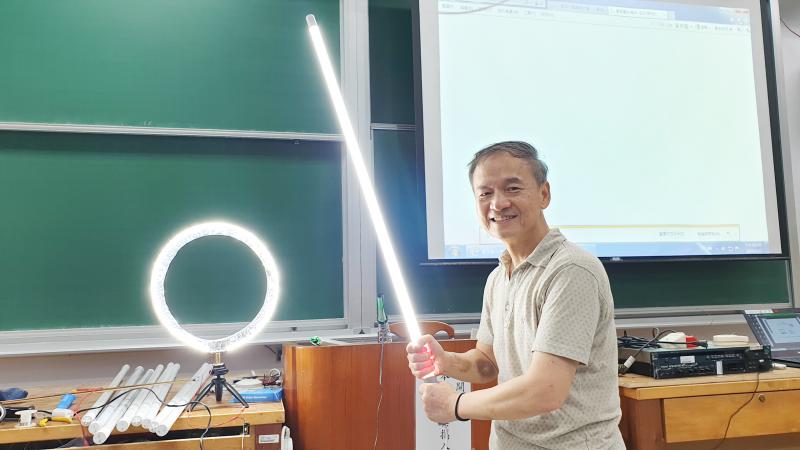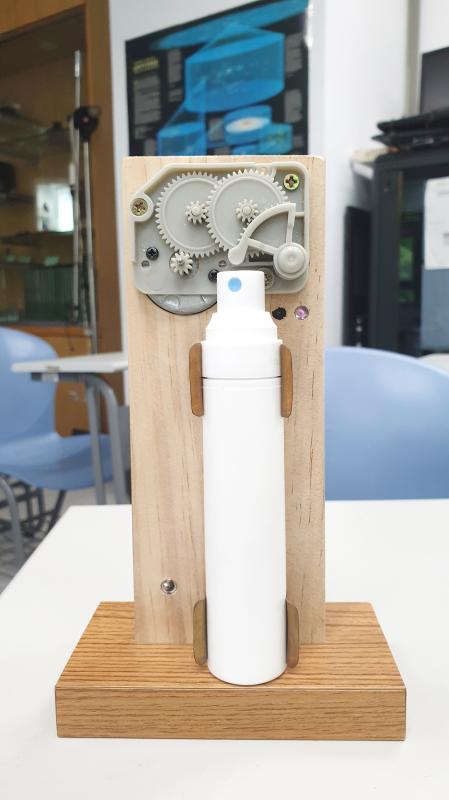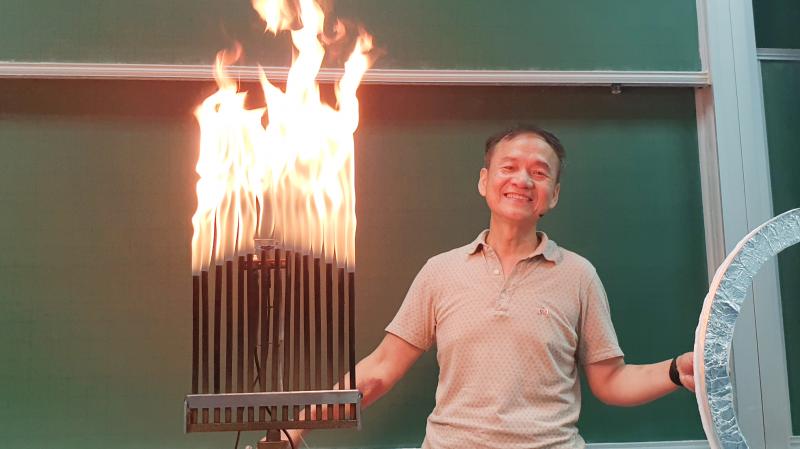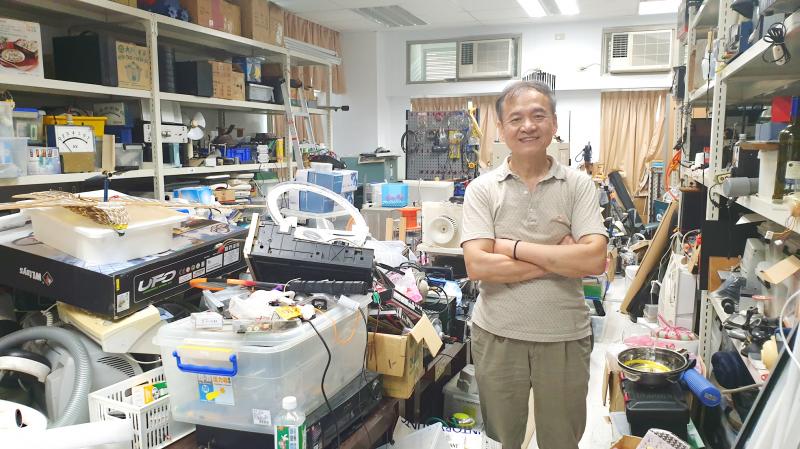Chen Chiu-min (陳秋民) can make a lightsaber out of a broken light tube in 10 minutes using just NT$1 worth of material. He can blow giant smoke rings with an air cannon, and create spectacular flames out of an old water heater. And he’s always eager to show visitors more, as he scurries in and out of his workshop at Soochow University (東吳大學), where his physics lectures are dubbed “magic performances.” A few minutes later, he’s playing Auld Lang Syne on a musical saw and making thunder sounds with a modified Pringles can.
Two hours into the “show,” I forget that I originally came to speak to Chen regarding the COVID-19 pandemic, as he cobbled together a cheap and easy-to-make ultraviolet disinfection device for face masks from household goods. He also made a portable automatic hand sanitizer dispenser from spare parts. But watching him chuckle to himself after demonstrating each device, it’s not hard to see why his infectious energy and creativity has made him one of the more popular professors on campus.
Most people call Chen “Goose Dad” (鵝爸). About two decades ago, his colleague’s pet geese were killed by stray dogs. They left behind a few eggs, which Chen personally hatched using an incubator made from lights and a temperature regulator he procured from discarded electronics. The goslings imprinted on his family and followed them around their neighborhood — and the nickname stuck even after the birds died.

Photo: Han Cheung, Taipei Times
Chen started tinkering as a child, making his first lightbulb out of automatic pencil lead in the fifth grade. But he failed to get into college twice, which led him to put extra effort in inspiring students that are intimidated by science and discouraged by poor grades. Not only is it important to make the material fun and relatable, he says a good teacher should be entertaining.
Besides practical inventions, most of his devices are used to demonstrate physics principles during class. When asked about his automated hand sanitizer, he says “I couldn’t find one so I made it myself. But the main purpose was to show it to the students and inspire their creativity.”
‘MACGYVER PHYSICS’

Photo: Han Cheung, Taipei Times
It’s somewhat cliche to nickname every person who likes tinkering and building things out of common objects a “MacGyver,” after the popular 1980s television series, but Chen says he actually has a class next semester called “MacGyver Physics.”
“One reason why students generally don’t like physics class is that the teachers make it too hard to understand,” he says. “My goal is not to train scientists; I want all students to be able to see and apply physics to their lives.”
The hallway leading to Chen’s workshop is lined with junk that he retrieves regularly from the school’s recycling center. “Look at this,” he says, turning on a ringing alarm with flashing red lights. “It still works. I don’t know why they threw it out.”

Photo: Han Cheung, Taipei Times
And his workspace, which is behind the physics demonstration classroom, is piled to the ceiling with home-made contraptions and spare parts.
Even when things are considered broken, Chen will tirelessly lug them back to this workshop. He explains to me how LED lights work as he repairs one in about five minutes.
“I have hundreds of these broken lights,” he says. “They’re not that difficult to fix. You’ll know how to do it after I show you.”

Photo: Han Cheung, Taipei Times
“I’m very environmentally conscious,” he adds while pulling up a video of a simple trash compressor he built. “I only need to take out the garbage twice a week. If everyone does this, will the government start charging by weight instead of by bag?”
Those who haven’t taken his classes should be familiar with the torch system he designed for the school’s anniversary festivities. Originally, they used a kerosene torch, which could be dangerous if the torchbearer tripped and spilled the liquid; Chen says they were hard to put out, so he built a safe, button-activated version using a tin can, stainless steel scrubber and a tennis racket handle with an adjustable flame. He spins the torch around as if it were a bo staff to show its effectiveness.
The last thing Chen shows me is the Olympics-style flame “cauldron” he made out of a broken water heater which he ignites with a garage door remote.
“People think the torch bearer lights the cauldron, but actually I’m controlling the flame,” he laughs. “I bring this machine to the festivities every March, but normally this is used to teach a very important topic in my lectures: the physics of gases.”
Before I eventually leave, Chen casually says: “You almost didn’t get to interview me. I had a heart attack last week.”
He certainly shows no sign of it.

March 2 to March 8 Gunfire rang out along the shore of the frontline island of Lieyu (烈嶼) on a foggy afternoon on March 7, 1987. By the time it was over, about 20 unarmed Vietnamese refugees — men, women, elderly and children — were dead. They were hastily buried, followed by decades of silence. Months later, opposition politicians and journalists tried to uncover what had happened, but conflicting accounts only deepened the confusion. One version suggested that government troops had mistakenly killed their own operatives attempting to return home from Vietnam. The military maintained that the

Taiwan has next to no political engagement in Myanmar, either with the ruling military junta nor the dozens of armed groups who’ve in the last five years taken over around two-thirds of the nation’s territory in a sprawling, patchwork civil war. But early last month, the leader of one relatively minor Burmese revolutionary faction, General Nerdah Bomya, who is also an alleged war criminal, made a low key visit to Taipei, where he met with a member of President William Lai’s (賴清德) staff, a retired Taiwanese military official and several academics. “I feel like Taiwan is a good example of

Jacques Poissant’s suffering stopped the day he asked his daughter if it would be “cowardly to ask to be helped to die.” The retired Canadian insurance adviser was 93, and “was wasting away” after a long battle with prostate cancer. “He no longer had any zest for life,” Josee Poissant said. Last year her mother made the same choice at 96 when she realized she would not be getting out of hospital. She died surrounded by her children and their partners listening to the music she loved. “She was at peace. She sang until she went to sleep.” Josee Poissant remembers it as a beautiful

Before the last section of the round-the-island railway was electrified, one old blue train still chugged back and forth between Pingtung County’s Fangliao (枋寮) and Taitung (台東) stations once a day. It was so slow, was so hot (it had no air conditioning) and covered such a short distance, that the low fare still failed to attract many riders. This relic of the past was finally retired when the South Link Line was fully electrified on Dec. 23, 2020. A wave of nostalgia surrounded the termination of the Ordinary Train service, as these train carriages had been in use for decades